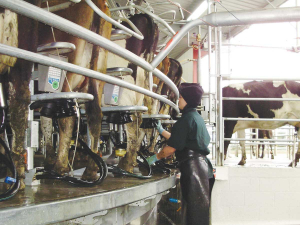Fonterra’s exit from Australia ‘a major event’
Fonterra’s impending exit from the Australian dairy industry is a major event but the story doesn’t change too much for farmers.
 Commentators believe another factor contributing to the decline in prices could be increased milk production coming out of New Zealand.
Commentators believe another factor contributing to the decline in prices could be increased milk production coming out of New Zealand.
After a buoyant month, dairy prices have fallen on the back of renewed concerns around a resurging Covid-19.
The price of Fonterra’s flagship whole milk powder (WMP) offering dropped 7.5%, its largest decline in more than three years.
WMP prices sit at US$3,003/metric tonne – around 6% below the pre-Covid level in January.
While analysts have described the price dip as tough and disappointing, for the time being they are sticking to their forecast payouts for 2020-21 of between $6.50 to $6.75/kgMS.
Westpac senior agri-analyst Nathan Penny remains “cautiously optimistic” on the outlook, but warns that risks remains high.
“Despite the price fall, current prices remain consistent with our $6.50/kgMS milk price forecast for 2020/21,” he says.
“We have allowed for prices to fall further over the New Zealand spring, although the steep fall means we have a little less wriggle room than we previously had.
“That said, it pays to note that it is still early days in the season and the uncertainties around the Covid impact through the full dairy season remain large.
“On this basis, we recommend that farmers approach the season with ‘eyes wide open’ and continue to closely follow dairy market developments.”
ASB’s Chris Tennent-Brown says the price dip was not unexpected.
“We had been factoring some retracement of the large jump in prices that we saw in July, and this is happening,” he says.
“Prices need to stabilise around the current levels to support our milk price forecast.”
Following the previous GDT event a fortnight ago, ASB lifted its forecast for the 2020/21 season from $6.50 to $6.75.
RaboResearch’s US-based dairy analyst Thomas Bailey says softer Chinese consumer demand for dairy and continued spread of Covid-19 had spooked the markets.
“The question remains around the stability of Chinese demand for dairy products,” Bailey says.
“Demand in China is not as strong at the consumer level as recent indicators such as trade and price reflect.”
But it’s Covid-19 that is still wreaking havoc in markets.
Penny notes that the steep price fall comes as several countries battle renewed outbreaks and as total global Covid-19 case numbers continue to increase rapidly.
“Indeed, some dairy markets that were successfully containing Covid have now seen cases spike again,” he says.
“With this in mind, it appears that dairy markets have begun to act on this renewed Covid risk and have pushed prices lower once again.
“This backdrop contrasts with the apparent Covid sweet spot over early July.”
There may be another factor contributing to the decline in prices –increased milk production out of New Zealand, particularly drought-stricken Waikato.
Tennent-Brown says it attributed some of the strength in near-term prices back in July to buyers adding some padding to stocks as a risk management strategy given the acceleration in global Covid-19 cases and increased potential for logistics disruption.
That pressure seems to have reduced, with near-term contract prices around US$3,050 to US$3,100/tonne. Longer-term contract prices have dipped back below US$3,000/tonne, so buyers are clearly less concerned about supply further into the season.
Fonterra’s impending exit from the Australian dairy industry is a major event but the story doesn’t change too much for farmers.
Expect greater collaboration between Massey University’s school of Agriculture and Environment and Ireland’s leading agriculture university, the University College of Dublin (UCD), in the future.
A partnership between Torere Macadamias Ltd and the Riddet Institute aims to unlock value from macadamia nuts while growing the next generation of Māori agribusiness researchers.
A new partnership between Dairy Women’s Network (DWN) and NZAgbiz aims to make evidence-based calf rearing practices accessible to all farm teams.
Despite some trying circumstances recently, the cherry season looks set to emerge on top of things.
Changed logos on shirts otherwise it will be business as usual when Fonterra’s consumer and related businesses are expected to change hands next month.